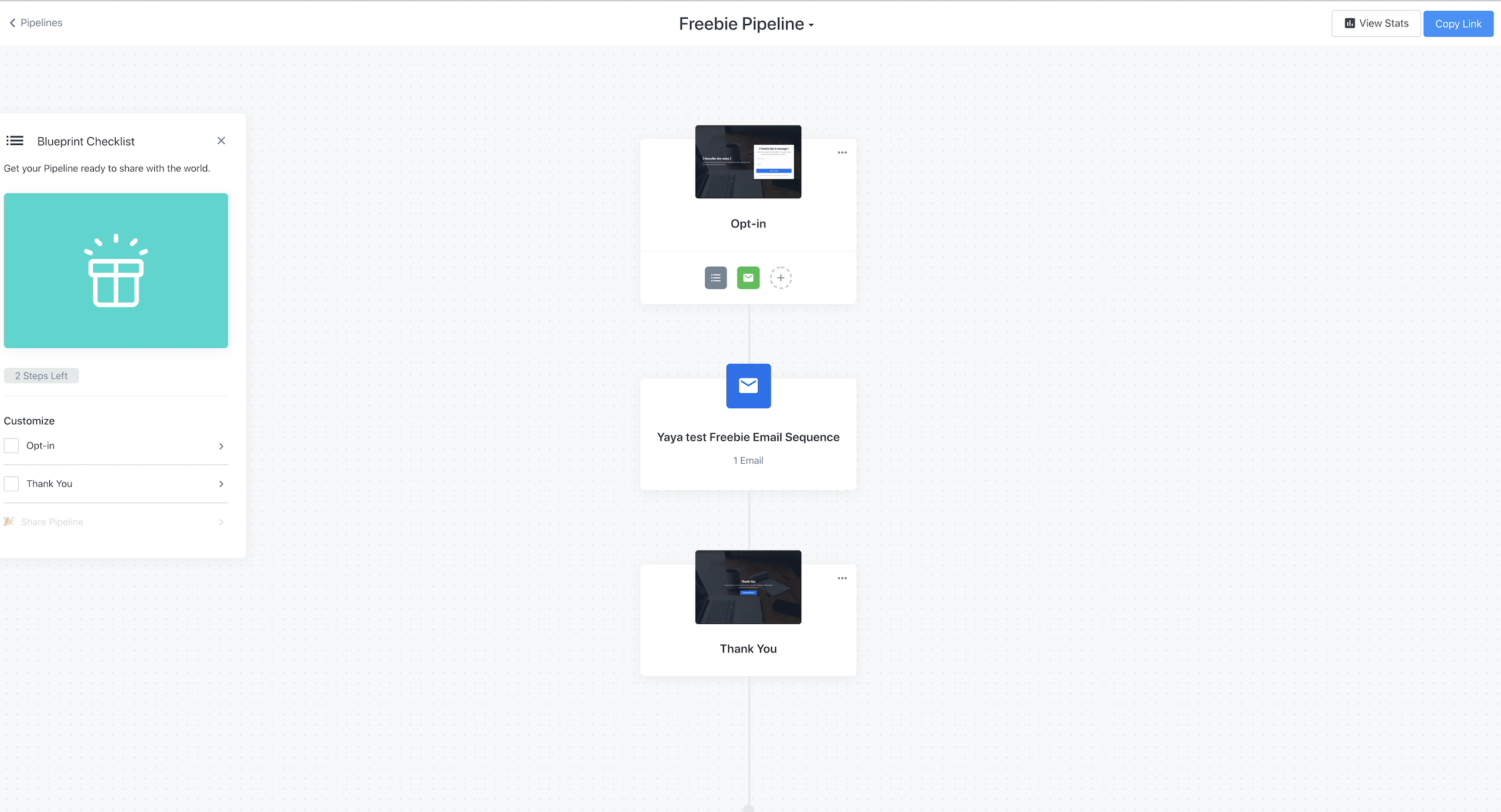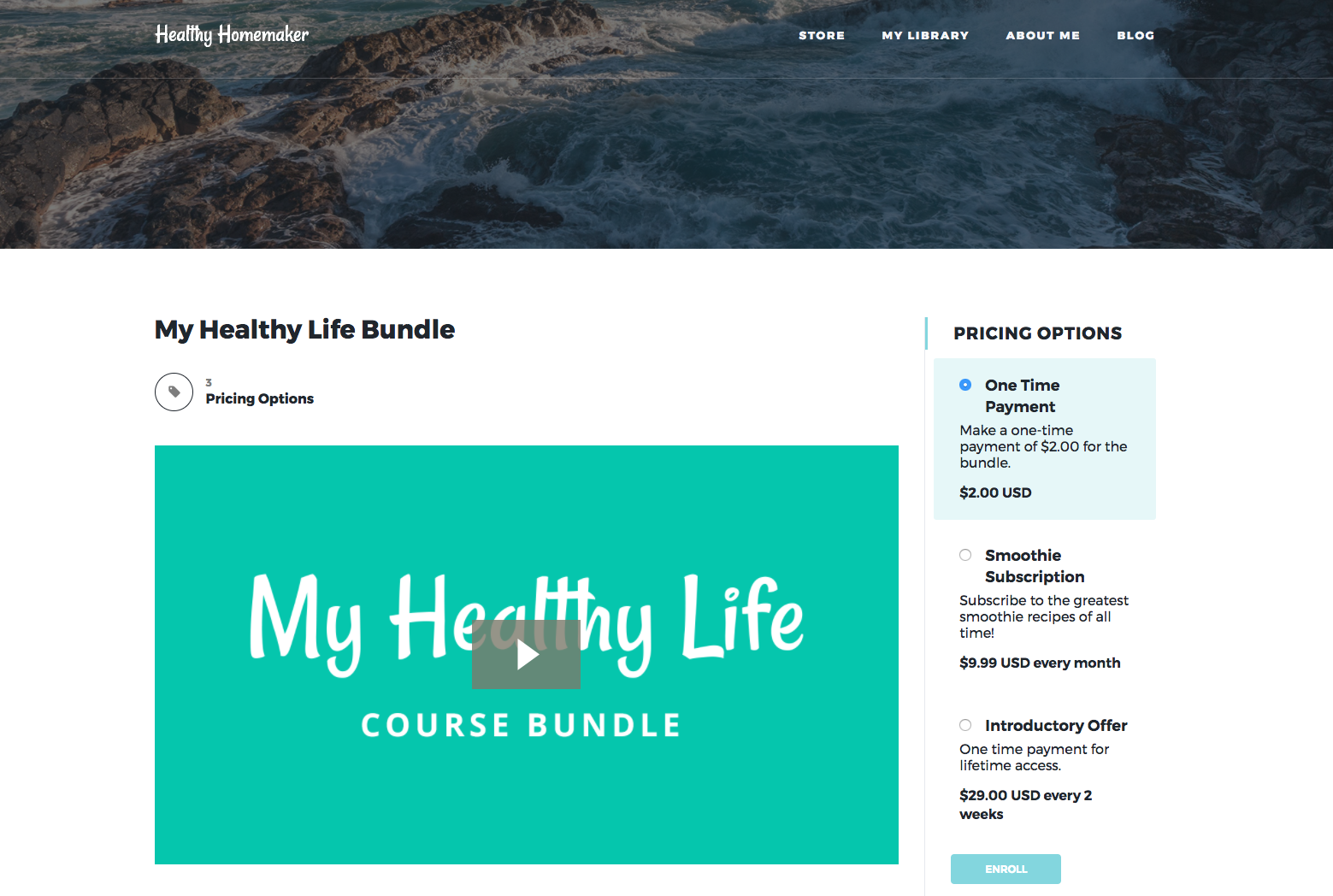
20 Tips on How to Market an Online Course
Oct 29, 2020Everyone has a unique set of knowledge and experiences that would undoubtedly benefit others—so why not turn those assets into your own online course and generate additional income?
Online courses allow you to share your knowledge with the world and get paid for it at the same time. But often, content creators aren't sure where to begin, or how to market an online course once it's created.
It’s actually not as intimidating as it seems, especially if you have the right tools and know the best practices for marketing online courses.
This guide will teach you not only how to market your online course, but also how to boost your sales through the next year and beyond.
3 Steps to Take Before You Market Your Online Course

Before diving into the specifics of how to market an online course, there are a few boxes you should check to ensure your campaign is set up for success. For starters, you need to create the best online course possible so you have a product that will convert. To help, we've put together an all-star guide on how to create your own online course in as few as 9 steps.
Once you’re confident your course is ready to hit the market, take these three additional steps to prepare for your marketing campaign.
1. Establish yourself as an authority and expert in your field.

People want to learn from recognized authorities. That’s why educators with master’s and doctoral degrees often get invited to lecture. However, you don’t need advanced education to establish yourself as an authority and expert in your field.
Before marketing your online course, build some buzz and expertise around your name by taking the following actions:
- Make a list of your accomplishments. Have you won awards? Received degrees or certifications? Conducted your own research? Built a business? Compile a list of all the accomplishments you’ve achieved and publish them in prominent places (e.g. landing pages, homepage, LinkedIn profile).
- Read and create as much content as you can. Even if you already have experience in a particular subject area, update your knowledge. Start consuming content created by others in your field to fill in any knowledge gaps and to better understand your competition. Then, create content that’s related to your course offering. Publish it on your site or on other publications—anything you can do to build up your authorship on the web will help establish your position as an authority in your field.
- Participate in online conversations. Consider joining Quora or Yahoo! Answers so you can help other people when they ask questions. Your advice can serve as the basis for your authority and also provides the opportunity to link to your website. Online forums like Reddit also offer chances to get your name out there and to establish your credibility.
Start the process of pre-selling your online course now, so that once you start marketing your online course, you’ll have established the credibility to make people want to buy it as quickly as possible.
2. Get to know your target audience personas.

It’s virtually impossible to know how to market your online course if you don’t know who your target audience is.
Every entrepreneur (that's you, if you plan to market and sell online courses this year!) has a target audience. Think of your target audience as the people who might pay to hear you speak at a conference. They’re interested in your subject matter, want to learn more about what you teach, and are willing to pay for advice, guidance, or instructions. You offer a product or service that solves their problems.
One foolproof way to identify your target audience is by building audience personas. Also called buyer personas, these fictional biographies describe your target audience in excruciating detail.
To build your buyer personas, begin by answering the following questions about your target audience:
- Where do they like to hang out online?
- How old are they?
- What influences their buying decisions?
- Why are they interested in your topic?
- What pain points do they need you to address?
- How much money do they earn?
- Where do they live?
You’ll create a list of qualities and facts based on your own research. If you followed the first tip and started to establish yourself as an authority, you’ve already glimpsed your audience and gotten to know some of their needs.
3. Identify a specific solution for your target audience.

Once you know your audience, you’re practically ready to start marketing your online course. All that’s left to do is figure out how you can help your target audience so you can effectively leverage your knowledge when marketing your course. An online course won’t sell just because you put a popular topic in its title. You need to give your audience a meaty, compelling reason to invest.
Let’s say, for instance, that your target audience is work-from-home mothers who want to lose weight after having a baby. You know that they don’t work outside the home, they’re stressed out and short on time, and they’re struggling with their weight.
Now you need to give them a solution.
You might create a course on preparing fast, healthy meals made from whole foods. Notice the adjectives in that sentence—you’re narrowing your course’s topic to appeal specifically to your target audience:
- Fast: New mothers have their hands full with diapers and other mothering duties.
- Healthy: Your audience wants to lose weight, so you need to provide healthy options.
- Whole foods: Mothers often breastfeed their children, so they want to avoid processed chemical-laden foods.
You can do this exercise with any topic. Pick your target audience, then figure out how to address a pain point or solve a pressing problem with an online course. Use the solution you’ve identified as the driving force behind your marketing campaign, and you’ll be able to capture the demand of your most valuable customer base.
How to Market Your Online Course to Consistently Increase Sales
To market your online course and increase your sales year over year, you need a satisfying hook and a way to reach your target audience. We've put together a comprehensive list of tips that will teach you how to market an online course specifically to your customers.
As a general rule, make sure to keep your specific goals in mind. Focus on tactics that make sense for your product, rather than wasting time on those that won’t generate much return on investment. After all, you’re trying to make money — not flush it down the proverbial drain.
1. Create and Optimize Your Website
These days, it’s essential to have a website—especially since your entire product is online. Your website helps you funnel traffic toward your online course and is likely the first thing people will search for when they hear of you.
Since you’re planning on marketing and selling online courses, your website should establish your authority right away. On your homepage, include a photograph of yourself, testimonials from people who have witnessed your work or your skill, and information about why you’re qualified to teach your courses.
Keep it short and sweet, but use compelling action words and specific adjectives to get your point across.
A website should include other pages, as well, including:
- About page: Go into more detail about how you can help your audience reach their goals or solve their problems. Don’t make it all about you. One of the most important lessons of learning how to market an online course is balancing how to make your target audience feel cared for while also promoting your product.
- Contact page: Make sure prospective customers can get in touch. If possible, offer multiple methods of reaching you, such as a contact form, an email address, and a phone number.
- Sales page: A sales page lists all of your products along with brief descriptions. Each product name should link to an individual product page. It’s important to get your sales pages right; think of them as the online equivalent of an elevator pitch. You get just a few seconds to snag your audience’s attention and to convince them they want more
- Product pages: You’ll need a product page for every online course you offer. Eventually, you can also use product pages to offer course bundles.
As you continue learning how to market your online course, you’ll find that A/B testing goes a long way in optimizing these crucial pages. You might find that a simple copy change or additional CTA increases your conversions two-fold!
If you’re looking for some inspiration, check out the sales page one of our #KajabiHeroes, Steve Wells, created. It lists his various courses along with compelling images and brief descriptions. There’s a clear “Learn More” button after each one.

2. Start a Blog
In this social media age, many educators and entrepreneurs forget about one of the most tried-and-true ways for marketing an online course: blog posts. Think of your blog as a gateway to your paid content. You’ll use it to demonstrate your expertise, help your audience, and develop an internet presence.
If you learn basic SEO principles and blog regularly, you can establish a devoted audience. Even if you don’t have many readers or commenters at first, keep publishing on a regular schedule. Eventually, your tribe will find you.
Before you start your blog, however, think carefully about what to call it—your title can greatly affect how you market your online course. You can use your own name or a keyword related to your specific audience or subject, but make it snappy and memorable.
As you’re creating content, always keep your target audience in mind. Solving the needs of your target audience should always be front-of-mind for any marketing effort you embark on.
3. Create a Sales Pipeline for Your Online Course

A Sales Pipeline (which you can easily create in Kajabi) gently guides prospective buyers toward their first purchases. The top of the Pipeline represents people you’ve never met before. You attract them to your online course through social media, email marketing, blogging, and other online activities.
As prospects move through the funnel, they get closer to a purchase. The next stage in the Pipeline might be impressing prospects with your depth of knowledge and offering a free sample to capture their email addresses.
Next, launch your email campaign and include calls to action that encourage them to buy your course. At the very bottom of the Pipeline lies the shopping cart—the moment of purchase.
Your Sales Pipeline and how you market your online course should be based on the marketing channels that work well for your offering and what you know about your audience. For instance, if you already have a large social media following, you’ll likely start your Sales Pipeline there.
4. Boost Your Social Media Presence

Speaking of social media, it’s time to get busy on this front, as it's become one of the top ways to market an online course (or any product, for that matter). Set up accounts with two or three of the main social platforms and use them to build and engage with your target audience.
Marketers can use Facebook to promote their blog posts, engage in conversations with their followers, and share interesting links with their audiences. It’s the ideal social media platform for hosting giveaways and other special events, finding influencers, and gaining insight into your audience. Consider setting up a Facebook business page for your online courses.
Features like Facebook Stories and Facebook Live give you an opportunity to add personality and authenticity to your marketing strategy by connecting personally with your audience (you can even engage in live Q&A sessions on your course). Once you know the basics of how to market and online course on Facebook, you can start to grow a self-sufficient community of followers who share your product with their friends—it’s practically free marketing!
As a highly visual social media space, Instagram is less about what you say and more about showcasing your creativity. This doesn’t mean it’s not useful for business purposes; in fact, it has a constantly growing user base and a highly engaged community.
Bold and easily consumed visuals have become critical quick-hit marketing tools, capturing your audience's attention instantly. And like Facebook, Instagram Stories, Instagram Live, and Instagram TV (for longer videos) are excellent tools in exemplifying how to market an online course for social consumers. Consider sharing photographs and Instagram stories that relate to your course content, running polls and Q&A sessions, and linking to your products directly from your photos and videos.
YouTube
If you’re willing to stand in front of a video camera, YouTube can provide significant visibility, especially if you’re comfortable speaking about your topic. Use YouTube to share brief videos that answer single, important questions related to your online courses, or even to embed longer-form content directly onto your website, such as interviews with other experts in your field.
Think of Twitter as blogging lite. You only get 140 characters to share a message, so you have to pare down your words to the most meaningful ones. Twitter works well to market your online course if you want to build a massive audience while engaging with other people who share your passions and interests.
Snapchat
Consider using Snapchat to make your prospective customers feel like they’re part of your club or team. It’s a great way to give a peek behind the curtain and to show why you’re qualified to write online courses. Use it to increase transparency.
In terms of business, LinkedIn is the definitive social media network—and depending on your product, it may be the best choice for marketing your online course. It’s designed to bring entrepreneurs, business owners, and employees together. Promote your online courses by publishing on LinkedIn, sharing your blog content, asking questions of other professionals in your industry, and connecting with like-minded folks.
SlideShare
Remember PowerPoint presentations? Now you can create more attractive slides to share with your audience. SlideShare is a little like PowerPoint except that you host your slides on the web, sort of like a flipbook. Use it to share brief chunks of information grouped by the same idea, such as 10 ways to accomplish a goal or 15 reasons to perform some task.
While Pinterest isn’t always beneficial for online course creators, it can prove invaluable for entrepreneurs in certain industries. If your courses relate to fashion, home decor, education, food, or similar content, share images on Pinterest to promote your courses.
5. Utilize an Editorial Calendar
Now that you’ve started a blog and delved into social media, you need a way to stay organized. Editorial calendars allow you to schedule content ahead of time so you don’t forget or get too overwhelmed. For instance, you can schedule your blog posts, Tweets, and/or Facebook updates to go live on a certain day by writing them in advance.
Use your editorial calendar to build excitement for your online course’s launch. Build up steadily by offering tidbits of information to entice your potential customers.
6. Build an Email List
Email marketing continues to represent one of the most effective strategies for generating, nurturing, and converting leads for online courses. It’s a direct line to potential customers, so use it wisely.
To build your email list, invite prospects who are part of your target audience to sign up on your website, through social media, and elsewhere. Send regular emails with interesting, actionable content that hints to the information found in your courses.
7. Take Advantage of Testimonials and Influencer Reviews
Social proof offers a quick way to build trust without having to develop a relationship directly with your prospect. Testimonials and verified customer reviews show your target audience that other people have appreciated your talent, skills, and teaching ability, which instills confidence in prospects.
You might not have any testimonials yet, but when you start to sell courses, ask your customers to send feedback. When you receive positive comments, most them to your course page and blog so others can see them.
Another increasingly lucrative avenue for exposure: influencers. An influencer is someone who has a devoted audience—large or small—on social media or a blog. Influencers have—you guessed it!—influence over their followers because they’ve spent years build a rapport with their followers.
When an influencer recommends a product, such as an online course, sales often shoot up dramatically.
Research and reach out to influencers in your subject area or genre who have a following that aligns with your target audience. Let them know that you’re providing a detailed course on a specific topic and ask if they would like free access to it in exchange for an honest review of your course.
8. Utilize Guest Posting on Industry Blogs and Websites
You can also market your online course to new audiences by offering to guest post. Essentially, you’re writing an article that someone else will publish. While that might sound like working for free, the goal is to get more eyes on your own product.
In exchange for the guest post, the publisher will usually let you link to two or three places, such as your sales page, social media handle, and blog. Additionally, you can converse with the publisher’s audience in the comments section and start building new relationships of your own.
9. Partner with Other Online Entrepreneurs
Entrepreneurs often see themselves as lone wolves, but that isn’t always the case. When you partner with another entrepreneur, you gain access to each other’s audiences, and you get to combine your skill and knowledge sets, as well. You might even learn a new thing or two about how to market your online course!
Consider finding other authorities in your industry whose audiences closely align with your own. You could even develop a new course with someone else and market it together. Two heads are better than one, right?
10. Start or Participate in a Podcast
Podcasts have become the new blog. Everyone’s creating them because people can listen to podcasts on the way to work or while they’re on vacation. They don’t have to pay attention to words on the page; they simply have to put in their headphones and push “play.”
If you don’t have the time or desire to create your own podcast, consider offering to serve as a guest on someone else’s. This strategy will get your name in front of the podcaster’s audience and allow you to reach people who might not otherwise have found your courses.
11. Host a Live Webinar
If you’ve ever imagined yourself on live television, you can turn your dream into a reality. Live webinars put you in the spotlight while your audience watches live from their corner of the world. You can also record webinars to create evergreen content; people can tune in later if they missed out on the live feed.
Webinars allow you to connect with your target audience in a way that television does not. Participants can interact with you by asking questions, submitting feedback, and otherwise giving their comments.
If you’re a little camera shy, don’t worry. You can also use a live webinar to share your computer screen and walk your audience through the steps of a digital process. Alternatively, you can interview another expert and keep the camera trained on your interviewee. The options are limitless.
12. Bundle Several Courses with a Discount
There’s a reason bundles work. Consumers like to feel as though they’re getting a deal on something, even if they end up spending more money. When you bundle your courses together and discount them by a certain percentage, you’ll sell more courses even though your customers pay less for each individual course.
How to market your online course as a bundle depends on how many—and how varied—your courses are. This strategy really only works after you’ve created multiple courses, giving you the ability to create a series of work. If you haven't yet built up your product suite, you can also bundle other digital products, such as eBooks and white papers, to add even more value to the pile.
13. Speak at Local Events and Meetup Groups

Your marketing efforts don’t have to exist solely online. In fact, they shouldn’t. When you can actually look someone in the eye and talk about your work, you make a more intimate connection than you could through any digital means.
Local events and meetup groups give you a chance to talk about your online courses as well as share other information you think the audience would find interesting. Plus, you get instant exposure, and you can add public speaking to your list of accomplishments.
14. Offer a Limited-Time Satisfaction Guarantee
If you don’t have much in the way of social proof or authority, you can help engender faith in your products in other ways. One option is to offer a satisfaction guarantee. If you sometimes suffer from insomnia, you’ve likely seen this strategy used in a number of infomercials.
Just make sure you limit your guarantee to a certain time period based on the course’s complexity. Even a three- or four-day guarantee can help boost sales, but you might extend it to two weeks or 30 days, especially if your course will take several days or weeks to complete.
15. Celebrate Your Customers
If you teach a course that your customers can use to create or accomplish something, invite them to share their successes and give them a shout-out on social media or on your blog to let them know you’re rooting for them.
How does this help market your online course? By accomplishing two specific goals:
- Loyalty: The customer you celebrated will be much more likely to buy another course from you in the future and spread the word about their good experience.
- Social proof: You’re demonstrating that someone took your course and learned enough to accomplish something impressive with it, which could entice other people to buy the course, as well.
16. Write a Press Release
Some entrepreneurs go a little overboard with press releases, so it's wise to be strategic when using them as a marketing tactic for your online course. You only want to write and submit one when you have something genuinely newsworthy to share, like a new course release or major new partnership.
Use the accepted press release format if you want journalists to take your request seriously. Write a brief summary of the newsworthy information, then include a blurb about your company and your courses at the end. If journalists pick it up, you’ll gain instant exposure and access to a new audience.
17. Participate in Online Forum Discussions
People love to chat online, so why not join the conversation? Make a list of forums that relate to your course material, then sign up as a member. Include a link to your course page in your profile or signature, then start responding to people’s questions or stories.
The more active you become on forums, the more recognizable your courses get. Over time, you can build a loyal following with this one simple trick.
18. Create an Affiliate Program
One of the best ways to spread the word about your products is to have your partners help do the marketing for you. An affiliate may know how to market your online course in an exciting new way because of their own internal resources and unique perspective.
If you want people to evangelize your product, give them a financial incentive to do so. Affiliate programs work in three simple steps:
- Give each affiliate a unique code.
- Record each person who buys your course using the code.
- Give the affiliate the agreed percentage of the sale.
You decide what percentage you want to offer. You can also offer a flat-rate commission, such as $20 per sale.
19. Translate Your Course into Other Languages
It's a big, wide world out there, so don’t forget to market your online course outside of the U.S.! To instantly expand your course’s audience, get it translated into other languages. People who speak Spanish, Chinese, Korean, Russian, German, Portuguese, or Bulgarian might want to learn the information you offer in your course.
Knowing how to market an online course to an international audience is no small feat. As a general rule, don’t use an automatic program, such as Google Translate, to convert your copy to other languages. It’s not sufficiently reliable, and if the copy becomes unintelligible, you’ll lose credibility. Instead, hire an experienced translator. You can often find them in online marketplaces, such as Fiverr.
20. Invest in Paid Online Ads
Sometimes, you really do have to spend money to make money. Online advertising puts your content in front of more eyes, which often translates into more sales. Paid search, paid social, and display ads can all work in your favor, and provide you a direct line to your target audience. A few of the most common paid advertising strategies include:
- Google Adwords: If you sign up for Google AdWords, you can create a paid search program. Your ads will appear when people search for the keywords on which you bid.
- Facebook Ads: Set up Facebook ads so that your content appears on people’s newsfeeds.
- YouTube Ads: The same goes for YouTube. The company offers pre-roll ads as well as ads that appear in the middle or at the end of videos.
- Banner/Display Ads: Buying banner ad space on a website can also give your courses more visibility.
You can either join an advertising program or set up your online ads by yourself. If you’re a complete beginner, there are plenty of resources on the web that can teach you how to market your online course using specific paid advertising platforms.
Create Your Online Course on Kajabi

Now that you’re familiar with how to market your online course to increase your income, it’s time to create your course and get started. Kajabi offers a simple, all-in-one platform that lets you manage your website, blog, courses, sales page, email marketing, and other efforts under one roof.
It’s easy to create your first course, upload any content you want to include, and make it available for sale. Once you’ve created the first one, keep going so you can offer the aforementioned bundle discount. Before long, you’ll have a consistent revenue stream.
In Summary: How to Market Your Online Course
It’s not enough to create a course and let it sit on a random sales page. You need a marketing plan that will boost sales and increase your audience, so use the above strategies to make your courses not just interesting and relevant, but also profitable. And remember: always use your target audience as your North Star. At the end of the day, you are selling them a solution unique to their needs.
You don’t have to follow every step in the marketing book, either, so don’t let the volume of information intimidate you. Start small, with one or two social media channels, and build your email marketing list. Slowly develop your blog so it contains solid content, then continue creating courses.
You can even use excerpts from your courses to create blog content. Recycling your content makes it more valuable, and you’ll spend less time on the marketing side of the equation.
Have you created an online course? What methods did you use to market it, and did you manage to generate significant sales? By letting us know your own tips on how to market an online course, you get to pay it forward to your fellow entrepreneurs.
Lorem ipsum dolor sit amet, consectetur adipiscing elit. Cras sed sapien quam. Sed dapibus est id enim facilisis, at posuere turpis adipiscing. Quisque sit amet dui dui.
Stay connected with news and updates!
Join our mailing list to receive the latest news and updates from our team.
Don't worry, your information will not be shared.
We hate SPAM. We will never sell your information, for any reason.

